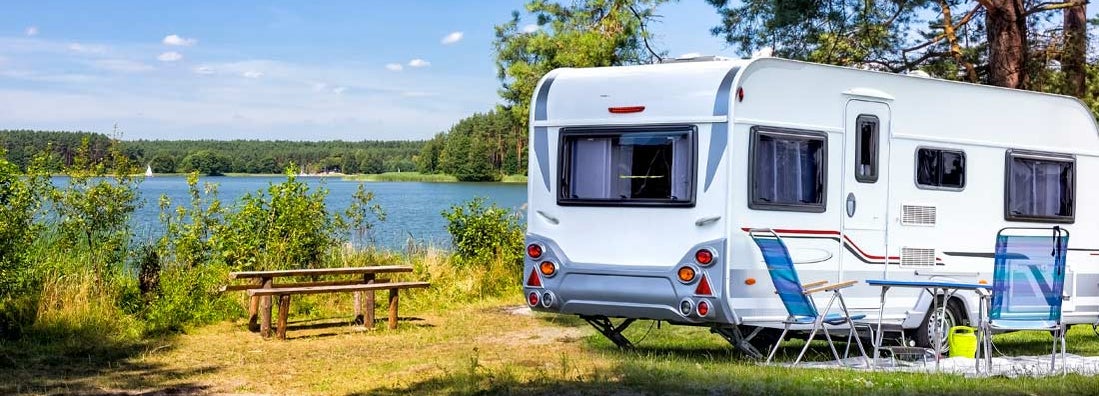RV Insurance in Minnesota
Experts break down recreational vehicle insurance costs, coverages, companies, and more in Minnesota.

Jeff Green has held a variety of sales and management roles at life insurance companies, Wall street firms, and distribution organizations over his 40-year career. He was previously Finra 7,24,66 registered and held life insurance licenses in multiple states. He is a graduate of Stony Brook University.

Traveling and living in an RV is a popular pastime for many people in Minnesota. In fact, residents of the North Star State spend about $187 million a year just on RV sales and services. If you own a recreational vehicle, a solid and reliable RV insurance policy can help protect your finances.
Local independent agents can shop around to find you a good policy at a competitive price. Talk to an independent insurance agent near you to start comparing customized quotes from some of the best RV insurance companies in Minnesota.
How Much Does RV Insurance Cost in Minnesota?
If this is your first time buying RV insurance, you are probably wondering if it is expensive. The answer is: It depends.
RV insurance rates can vary. Coverage for smaller vehicles like camper vans and travel trailers is much less expensive than it is for large, luxury RVs like Class A motor homes. Your customized RV insurance quotes will be based on several factors such as:
- The type and class of RV you are insuring
- Whether your RV is a motorized vehicle or a trailer
- Your RV’s length, weight, value, and condition
- The estimated number of miles you plan to drive your RV per year
- The amount of time you plan to spend living in the vehicle each year
- Your driving experience and record and your insurance claims history
- The amount of liability coverage you want to purchase
- The value of the personal property you have in your RV
- Which, if any, coverage options you are including in your policy
You may be able to earn valuable RV insurance discounts by bundling your coverage with other policies like car insurance or homeowners insurance or by having a solid history as a safe driver.
Independent insurance agents can help you compare policies and rates so you can choose the best and most competitively priced coverage.
Is RV Insurance Required in Minnesota?
In Minnesota, if your RV is a non-motorized trailer, like a fifth-wheel or a travel trailer, RV insurance coverage is not required by the state. Instead, your RV can be covered through a trailer insurance endorsement on the auto insurance policy of the vehicle that will be towing it.
However, if your RV is a self-propelled vehicle, like a motor home or a camper van, you are required by law to have an RV insurance policy. In this case, your RV will be held to the same minimum coverage requirements as your car or truck.
Additionally, though it is not required by law, physical damage coverage may be required by your lender if you are still paying for your recreational vehicle.
What Kinds of Coverage Can an RV Insurance Policy Provide in Minnesota?
In Minnesota, a minimum-coverage RV insurance policy will meet the state’s minimum requirements but nothing more. In Minnesota, all RV insurance policies must include:
- Liability insurance: This covers other people’s medical bills and property damage if you cause a collision. Your policy must include, at a minimum:
- Bodily injury liability insurance per person: $30,000
- Bodily injury liability insurance per accident: $60,000
- Property damage liability insurance per accident: $10,000
- Personal injury protection (PIP) insurance: This can provide coverage for you and your passengers if you are injured in a collision, regardless of fault. It can pay for things like ambulance services, medical treatment and supplies, lost wages, funeral costs, and survivor benefits. Your policy must include, at a minimum:
- PIP coverage per person: $40,000
- Uninsured/underinsured motorist insurance (UIM): This can provide coverage if you or your passengers are injured in an accident caused by an uninsured or underinsured driver and your medical costs go beyond what your PIP can cover. Your policy must include, at a minimum:
- UIM bodily injury insurance per person: $25,000
- UIM bodily injury insurance per accident: $50,000
In addition to the coverage that is required by law, those who are still making payments on their recreational vehicles will also have to include the following types of physical damage insurance:
- Collision insurance: This covers the cost to repair or replace your RV if it is damaged or totaled in a collision, regardless of fault.
- Comprehensive insurance: This covers the cost to repair or replace your RV if it is damaged or totaled by a non-collision event such as a severe storm or theft.
Once your RV is paid in full, collision and comprehensive coverage are optional.
As you can see, a minimum-coverage policy provides coverage when you are using your RV as a vehicle, but not for while you are using it as a home. That is why full-time RVers may want to include some of the many available coverage options in their policies. These options include:
- Personal liability coverage: This is ideal for people who live in their RVs full time. It is designed to provide the same personal liability protection you would normally get through a homeowners or renters insurance policy.
- Vacation liability coverage: This is ideal for people who take their RVs to various RV campgrounds. It is designed to provide additional liability protection, so you don’t need to worry if you accidentally cause property damage or injuries to others while staying at an RV park.
- Contents coverage: This is ideal for those who have a lot of valuable personal property in their RVs, which is often the case with people who live in their RVs full time. It can pay to repair or replace this property if it is lost or damaged by a covered event like theft, fire, or flood.
- Towing and roadside assistance: This is ideal for any RV enthusiast who will be spending a lot of time driving. Because most RVs require specialized towing if they become disabled while you are out on the road, service calls can get expensive, especially if you are out in the middle of nowhere. This insurance is designed to cover the costs.
Be sure to review all the coverage options offered by your prospective insurance companies. Looking at what they cover and how much they cost will help you make an informed decision about which offer a good value to you and your traveling companions.
What Is RV Gap Insurance in Minnesota?
If you do not have gap insurance and your RV is totaled, your compensation from your insurance company may not be sufficient to pay off your RV loan, leaving you still making payments on a vehicle you no longer own.
RV gap insurance is designed to bridge the gap between what you still owe for your recreational vehicle and what it is currently worth.
This can often be important because, during the first of couple years of new RV ownership, the value of your RV is likely to depreciate faster than the principal on your loan decreases.
Once your loan catches up to your vehicle value, this insurance is no longer of any value, so most people only pay for it for a year or two.
Minnesota Health Insurance for Full-Time RVers
Health insurance is important coverage. If you are not insured by an employer-provided policy, Medicare, or another health plan, a local independent agent can assist you with reviewing your options on the private market.
Your agent can help you find a policy that will provide the coverage you need no matter where in the US your RV has taken you. Your agent can also help you find suitable health insurance coverage if you plan to take your recreational vehicle into Canada or Mexico.
How to Find the Best Full-Time RV Insurance in Minnesota
When you are searching for the best RV insurance policy, it is a good idea to compare policies and rates from a few competing insurers.
Local independent insurance agents have established relationships with some of the best insurance companies in Minnesota so they can quickly and easily do the comparison shopping on your behalf.
This means that you can be sure that any policies your agent recommends to you are from insurance companies that have a time-tested record of reliable coverage, excellent service, and competitive rates.
Why Shop RV Insurance with a Minnesota Independent Insurance Agent?
Independent agents work for you, not for a specific insurance company. These agents are available to answer your coverage-related questions, offer guidance and advice, and help you find the best and most affordable coverage.
There are many benefits to having a local insurance professional on your side. Arrange an obligation-free consultation with an independent insurance agent near you to get more information and to start comparing customized RV insurance quotes.
https://www.titlemax.com/discovery-center/planes-trains-and-automobiles/which-u-s-states-spend-the-most-on-rvs-per-capita/
https://dps.mn.gov/divisions/dvs/forms-documents/documents/autoinsuranceinfo.pdf
